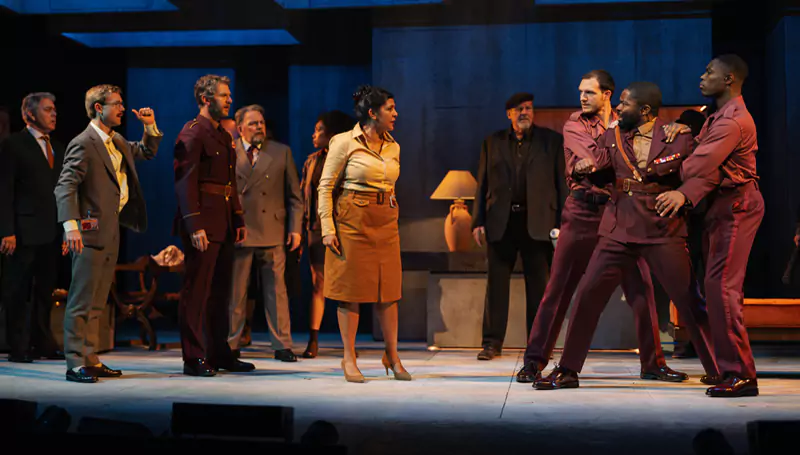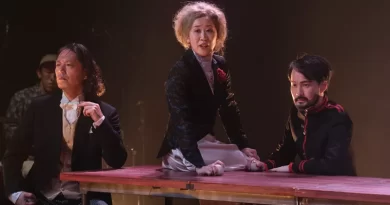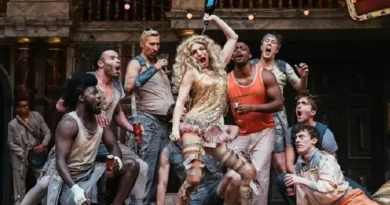“Coriolanus” at Olivier, National Theatre
Neil Dowden on the South Bank
30 September 2024
Coriolanus is the least known of Shakespeare’s three late Roman tragedies mainly because the eponymous hero (antihero?) is so dislikeable. He bears all the hallmarks of noble heroism as a military leader for Rome, but then uses his prowess for their enemies after he has been rejected as consul and banished. Unlike other Shakespearean soldiers who become fallen heroes such as Macbeth or Othello, whose tragic flaws cause them to commit terrible acts, it is difficult to have much sympathy for Coriolanus because of his arrogance and contempt for ordinary people. That is the central challenge for any production of the play.

Pamela Nomvete as Volumnia.
Photo credit: Misan Harriman.
Lyndsey Turner’s modern-dress revival – with a towering performance from David Oyelowo in the title role – on the National Theatre’s Olivier stage may not solve this problem but it’s a powerful and thrilling account with some contemporary resonance. We see Coriolanus’ upper-class elitism and antipathy for citizens’ rights, as shown in his put-down of grain rioters and disdain towards the tribunes representing the plebeians. But his uncompromising refusal to play the political game – by putting on a show of entreating plebs for their votes and displaying his war wounds to them – in order to get elected is contrasted with the tribunes’ devious manipulations in turning the people against him. As a soldier he is pre-eminent in open combat; but as a politician he is out of his depth in that murky realm.
Turner’s production dynamically presents the civil conflict in Rome. The anti-capitalist protestors – carrying placards proclaiming “You Profit, We Starve” and spraying orange paint like Just Stop Oil activists – confront Coriolanus as their class enemy. When he is reluctantly persuaded to stand as consul it’s not long before the tribunes press his buttons and he abandons his half-hearted engagement with gaining the citizens’ favour. Populist he is not. After he is accused of being a traitor he explodes in a rant, “I banish you!”

David Oyelowo as Coriolanus.
Photo credit: Misan Harriman.
The battle of Corioli – after which Caius Martius is honoured with the name of Coriolanus – is excitingly staged (fight director Sam Lyon-Behan) with swords and shields rather than modern weapons, as he almost singlehandedly defeats the Volscians, ending in one-to-one combat with his rival and ultimate nemesis Aufidius. In fact, it is really Coriolanus’ mother Volumnia who seals his fate as not only does she prompt him to take part in the disastrous election but it is she who finally prevails on him not to exact revenge and enter Rome with the Volscian army – the moment Aufidius has been waiting for to get rid of Coriolanus.
Es Devlin’s magnificent design sets the play in today’s world of mobile phones and laptops, but there are many references to ancient Rome within it. Colossal stone-like columns are raised to reveal an archaeological museum full of vases, busts, and statues (including one of a she-wolf suckling Romulus and Remus, leading to the mythic founding of Rome) for public scenes, while inside Coriolanus’ home there are also classical-style artefacts. Ash J Woodward’s video features war-cabinet Zoom calls and livestreaming Coriolanus’ awkward press conference as national war hero. A strong contribution is made by Tim Lutkin’s dramatic lighting including the Volscian battle-camp fires, Tom Gibbons’ atmospheric sound, and Angus MacRae’s ominous score.
Although short in stature, the beefed-up Oyelowo looks the part of a warrior in his athletic fight scenes, while his bullish presence and commanding vocal delivery strongly convey how Coriolanus inspires respect – or hatred. His intense relationship with Aufidius (an excellent, brooding Kobna Holdbrook-Smith) is more professional than homoerotic. Pamela Nomvete’s fiercely frank Volumnia seems to live vicariously through her son, though their final encounter lacks an emotional punch. She is contrasted with Kemi Bo-Jacobs’ nervously complaisant Virgilia, Coriolanus’ wife. Peter Forbes is superb as the pragmatist politician Menenius who perfects the art of moral compromise, while Jordan Metcalfe and Stephanie Street are, respectively, the rabble-rousing tribunes Brutus and Sicinius who may not be above accepting gifts of luxury clothing.









